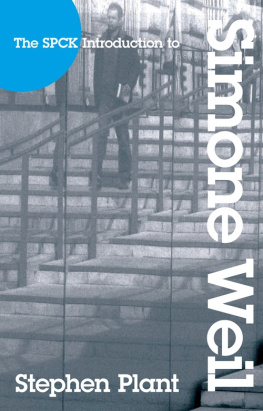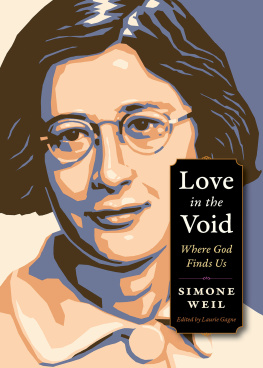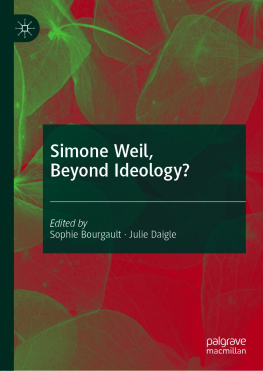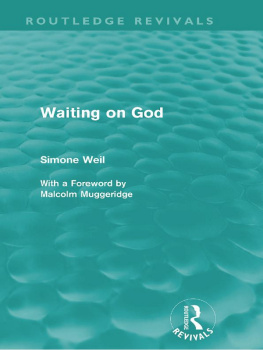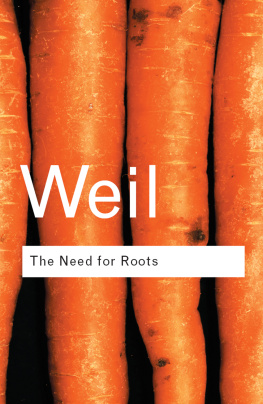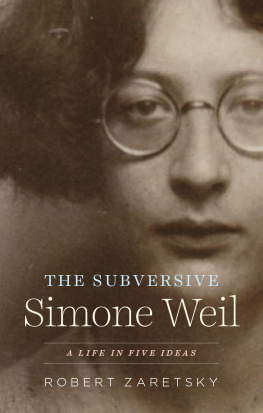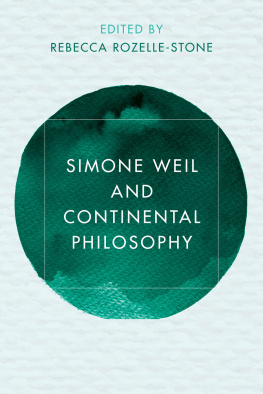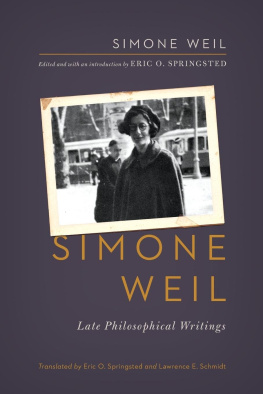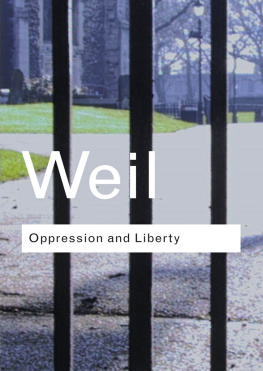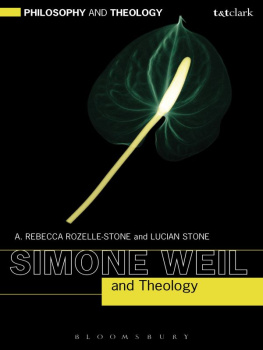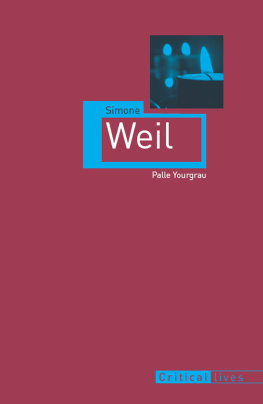Stephen Plant is senior tutor and director of studies at Wesley House, Cambridge. He teaches theology and ethics in the Cambridge Theological Federation and is an affiliated lecturer in the University of Cambridge Faculty of Divinity. He is a regular contributor to The Times newspaper and is the author or editor of several books, including Bonhoeffer (Continuum, 2004).
The SPCK
Introduction to
Simone Weil
Stephen Plant
First published in Great Britain in 1996 as Simone Weil
by Fount Paperbacks, an imprint of HarperCollins Publishers
This revised and expanded edition published in 2007
Society for Promoting Christian Knowledge
36 Causton Street
London SW1P 4ST
www.spckpublishing.co.uk
Copyright Stephen Plant 1996, 2007
All rights reserved. No part of this book may be reproduced or transmitted in any form or by any means, electronic or mechanical, including photocopying, recording, or by any information storage and retrieval system, without permission in writing from the publisher.
SPCK does not necessarily endorse the individual views contained in its publications.
The publisher and author acknowledge with thanks permission to reproduce extracts from:
Gravity and Grace , Simone Weil, copyright 2002 Routledge Classics. Reproduced by permission of Taylor & Francis Books UK.
Waiting on God , Simone Weil, copyright 1977 Fount Paperbacks (Collins). Reproduced by permission of Taylor & Francis Books UK.
Unless otherwise indicated, Scripture quotations are from the New Revised Standard Version of the Bible, copyright 1989 by the Division of Christian Education of the National Council of the Churches of Christ in the USA. Used by permission. All rights reserved.
The extract on p. 88 from the Authorized Version of the Bible (The King James Bible), the rights in which are vested in the Crown, is reproduced by permission of the Crowns Patentee, Cambridge University Press.
British Library Cataloguing-in-Publication Data
A catalogue record for this book is available from the British Library
ISBN 9780281059386
E-ISBN 9780281062874
1 3 5 7 9 10 8 6 4 2
Typeset and eBook by Graphicraft Limited, Hong Kong
Contents
This SPCK series aims to introduce thinkers who have made a significant contribution to Christian thought to as wide an audi-ence as possible in as intelligible a way as possible. It is an aim Simone Weil would have approved of. Though herself highly educated and uniquely intellectually gifted, Weil believed that the questions addressed by politics and philosophy, by literature and theology were too important to be confined to those with a high level of formal academic training. It was fundamental to her that the most profound insights in the history of human thought can and should be made accessible to all. She was surely right.
She was also right to assert that ultimately, the thing that matters, the thing we are seeking in literature, philosophy and theology, is not what it tells us about the author but what it tells us about truth. In one of her books, Weil asked a question that should daunt anyone preparing to explore her thought, and even more, anyone setting out to write about it:
Are there many books or articles which leave us with the impression that the author, first before ever beginning to write, and then again before handing the manuscript to the printer, asked himself with any real concern: Am I in line with truth? Are there many readers who, before opening a book, ask themselves with any real concern: Am I going to find truth in here?
(NR 257)
This book first appeared in 1996. Preparing a new edition of a text written more than a decade ago has proved to be a strange experience in which I have found myself in conversation not only with Simone Weil, but with a younger me. The task of writing a second edition certainly gives rise to a number of vexing issues, chief of which is the extent to which one revises the text in the light of ones present preoccupations and perspectives. Since I first worked on Weil I have become clearer about my own views of her writings. I have read more of the secondary literature some of it rich in raising issues and offering insights to which I was oblivious in 1996 that engages with her life and thought. I have become more aware of the importance of her distinctive reading of the writings of Plato, grown more appreciative of the illumination achieved in her essays on science, and have come to view her thinking less in episodes and more as an integrated series. I am much more disturbed by her antipathy to Jews, to Judaism and to the Hebrew Scriptures and more conscious of the significance of this in making sense of her writings. In short, I have grown more sympathetic towards Simone Weil as a person, but I have become more alert as the result of several years spent teaching Christian doctrine to a number of significant theological questions raised by her writings.
I have made significant revisions and additions through-out, but the main structural change has been the replacement of the brief conclusion in the first edition with a new and longer Chapter 5, in which I begin to comment upon Simone Weils life and thought from the perspective of Christian theology. I conclude with a guide to further reading in English.
Throughout this book, where I have cited Simone Weil I have used the English translation to be found in the most recent available edition. These translations were, however, written before translators became sensitized to gender-exclusive language. In what follows, therefore, I have allowed quotations from Weil to stand as they appear in the available translations even where (as in there is something sacred in every man) it jars with those, like me, who otherwise favour using gender-inclusive language where possible.
The first edition of Simone Weil was part of a series edited by Peter Vardy. I remain very grateful to him, in inviting me to contribute, for taking a punt on a rookie in philosophical theology. The idea for the present edition came from Rebecca Mulhearn of SPCK, who has provided just the right balance of efficiency and encouragement in the months in which I have worked on it. I am also grateful to several groups of students in Cambridge who have participated in my classes on political theology and whose questions and comments have helped to sharpen my thinking about Sainte Simone.
The first edition of Simone Weil appeared a few weeks before my marriage to Kirsty Smith, to whom it was dedicated. She gave me a scare at our wedding breakfast when in her speech she announced that she had wearied of competing for my attention with another woman, before conjuring Simone Weil from her sleeve. I am glad now to renew the books dedication and to add my continuing gratitude for the adventure of her friendship.
Stephen Plant
Simone Weil , London, Fount, 1996; US edition: Liguori, Mo., Triumph Books, 1996; Spanish translation: Simone Weil: Pensadores Cristianos , Barcelona, Herder, 1997.
FLN | First and Last Notebooks |
FW | Formative Writings 19291941 |
GG | Gravity and Grace |
GWG | Gateway to God |
IC | Intimations of Christianity among the Ancient Greeks |

